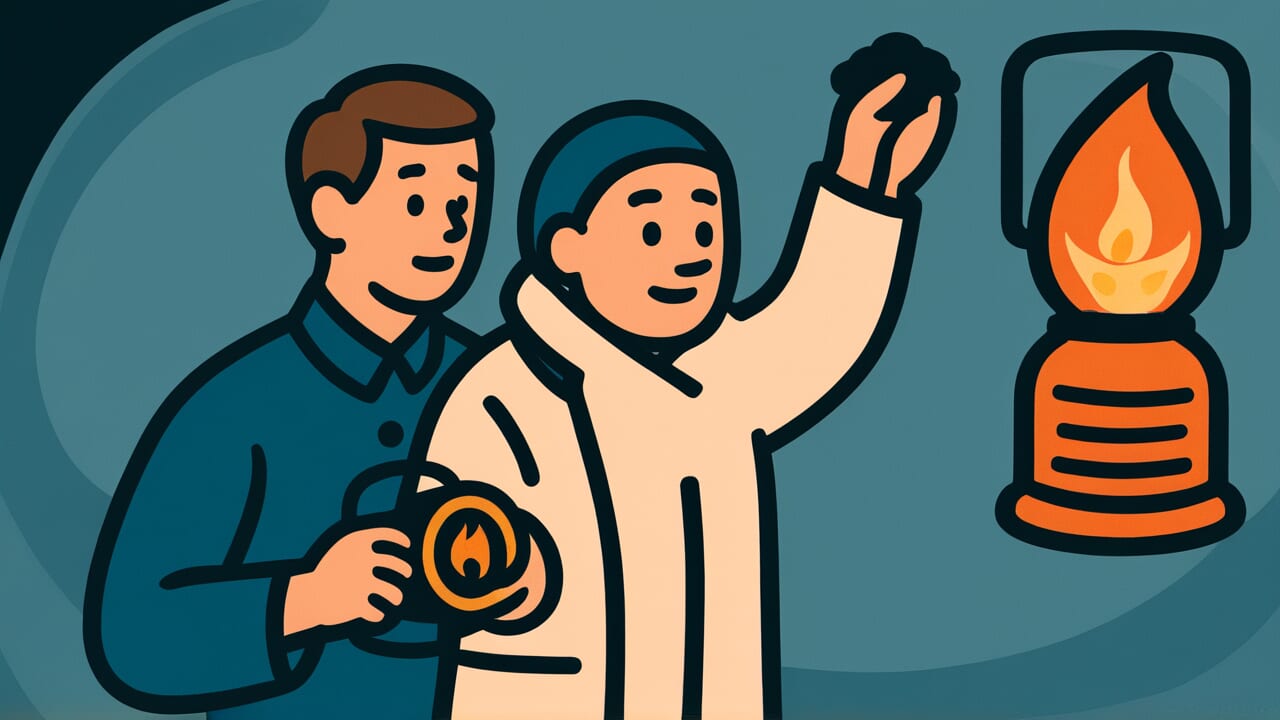How to Read “Warming your bottom with a votive light”
とうみょうでしりをあぶる
Meaning of “Warming your bottom with a votive light”
“Warming your bottom with a votive light” means trying to make do with whatever is close at hand and ending up failing. It describes situations where you choose an insufficient method just because it’s right in front of you or seems convenient, even though it can’t achieve your actual goal.
This proverb warns against the attitude of relying on easy shortcuts instead of proper preparation or tools. Just as a tiny votive flame cannot warm your body, inappropriate methods cannot achieve your purpose.
Even today, many people fail by relying on quick fixes when serious solutions are needed. This proverb teaches us the importance of choosing appropriate methods for our goals, rather than being misled by immediate convenience or ease.
Origin and Etymology
No clear written records document the origin of this proverb. However, we can make interesting observations from its components.
A votive light refers to a lamp offered before Buddhist altars or Shinto shrines. Until the Edo period, it was also an important lighting tool in common people’s lives. Oil was poured into a dish with a floating wick that was lit, creating a small flame with limited illumination range.
“Warming your bottom” means heating your body. In those days, people typically used hearths or braziers for warmth. These burned firewood or charcoal and required proper preparation and effort.
This proverb likely originated from the image of someone on a cold night trying to warm themselves with the tiny flame of a votive light meant for illumination. While the flame suffices for lighting, it’s completely inadequate for heating. Yet someone tries to use it for a different purpose simply because it’s nearby.
This concrete scene captures a universal lesson about human psychology and the failures it brings. The tendency to make do with what’s at hand, and the inevitable disappointment that follows.
Usage Examples
- I didn’t have time to prepare for my presentation, so I reused last year’s materials. It was like warming my bottom with a votive light—I couldn’t answer any questions.
- I bought cheap tools to save money, but they broke immediately and I had to buy new ones. It was truly warming my bottom with a votive light.
Universal Wisdom
“Warming your bottom with a votive light” brilliantly captures a fundamental human weakness and the mechanism of failure it creates.
Why do people try to make do with what’s at hand, even knowing it’s insufficient? The psychology at work includes wanting to avoid hassle and hoping to manage with what’s available. Proper preparation takes time and effort. Meanwhile, what’s right in front of you is immediately usable and easy.
At the root of this psychology lies human optimism and the tendency to underestimate difficulties. We think conveniently: “This should work somehow” or “I don’t need elaborate preparation.” Only after actual failure do we realize the importance of proper preparation.
Our ancestors must have witnessed this human trait repeatedly. That’s why they overlaid our universal foolishness onto the comical image of trying to warm yourself with a tiny votive light.
This proverb has been passed down through generations because this human essence hasn’t changed, regardless of era. In modern society, which pursues convenience and efficiency, this teaching carries even greater weight. Preparing appropriately for your purpose seems obvious, yet it’s actually one of life’s most difficult wisdoms to practice.
When AI Hears This
The energy in a votive flame actually has different qualities. The light from the flame is high-temperature, concentrated energy—high-quality energy that can do “useful work.” Meanwhile, the heat warming your bottom is low-temperature, dispersed energy—low-quality energy that can no longer do any work.
The second law of thermodynamics teaches that energy inevitably degrades from high quality to low quality. For example, boiling water at 100 degrees can generate electricity, but lukewarm water at 30 degrees cannot. Even with the same thermal energy, as temperature drops, the “degree of usefulness” decreases. Warming your bottom with a votive light accelerates this degradation. What could have been used as high-quality energy in the form of light gets converted into low-temperature heat around body temperature and ends there. This demonstrates on a small scale the “quality degradation” happening throughout the universe.
What’s fascinating is that this degradation process is absolutely irreversible. Gathering dispersed heat to recreate flame doesn’t violate energy conservation, but the law of entropy increase forbids it. In other words, foolish actions are physically irreversible too. Human failure and universal laws perfectly align here.
Lessons for Today
What this proverb teaches modern people is the truth that “proper preparation is the shortest path to success.”
Modern society values speed and efficiency. We’re expected to produce results quickly, and taking time for thorough preparation may seem wasteful. But that’s precisely why we need to pause and think. Is the method you’re about to use truly appropriate for your purpose?
What matters is developing the habit of thinking backward from your goal, rather than being swept along by immediate convenience. Before starting a project, confirm the necessary tools and knowledge. Before consulting someone, organize the appropriate information. Such seemingly tedious preparation ultimately saves both time and effort.
Of course, you don’t need to aim for perfect preparation. However, you should avoid the attitude of trying to get by with clearly insufficient means. Having the humility to ask yourself, “Will this really work?” That’s what protects you from failures like warming your bottom with a votive light.



Comments